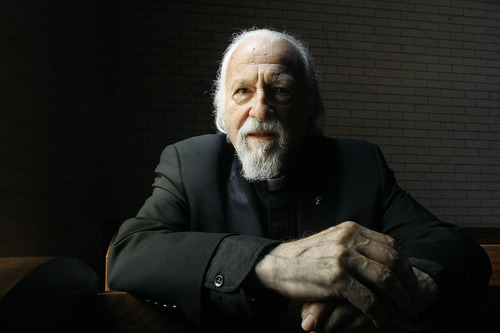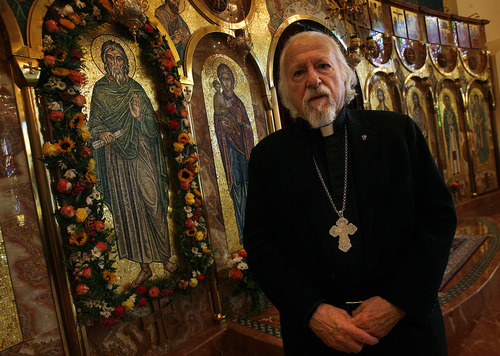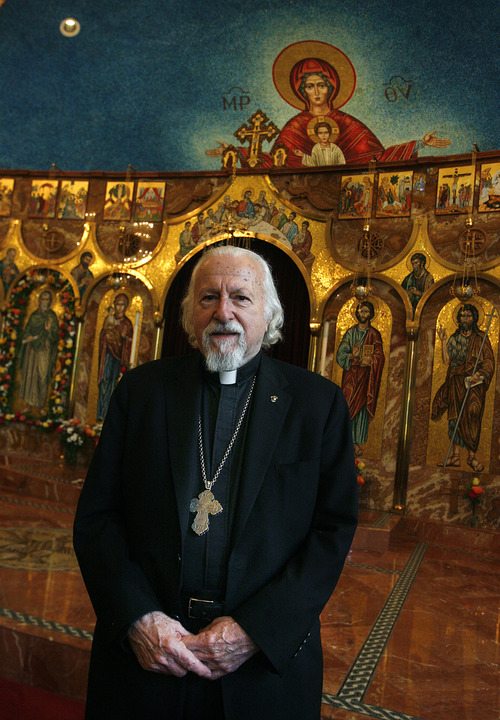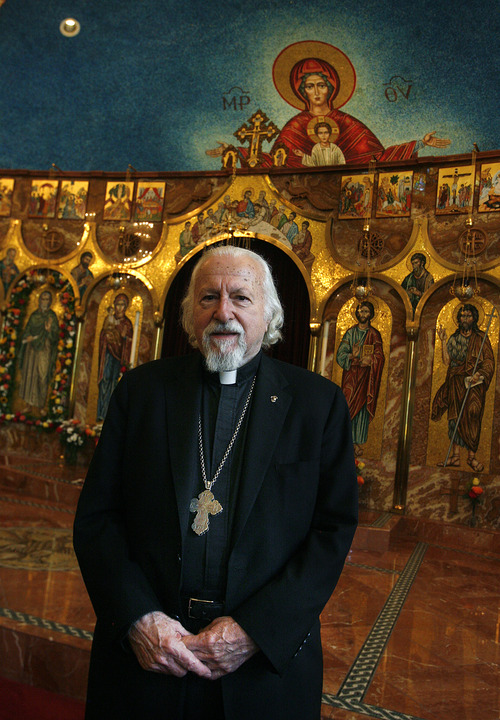This is an archived article that was published on sltrib.com in 2013, and information in the article may be outdated. It is provided only for personal research purposes and may not be reprinted.
He laments a nation turning away from God, but rejoices that many turn back to the faith. He sees an America in moral decline, yet holds out hope for even the worst sinner. He worries about all the selfishness, shallowness and violence in the world while bringing a message of unity, love and peace to Utah.
Metropolitan Isaiah, the regional leader of the Greek Orthodox Church, visited Salt Lake City this week, addressing members and preaching in two Salt Lake Valley churches for the feast day of Prophet Elias.
Though born in New Hampshire, Isaiah has a long history with the Beehive State. His uncle helped build Holy Trinity Greek Orthodox Church in downtown Salt Lake City in the early 1900s. In fact, that congregation was Isaiah's first assignment after his ordination in 1962.
Isaiah, who is based in Denver and oversees a 12-state region, has not been to Utah for more than three years. This interview occurred at Prophet Elias Greek Orthodox Church in Holladay. It has been edited for clarity and length.
What do you see as the major problems facing the world today?
I cannot speak for the world, but in America I see a drastic lessening of morality.
The principles that established our nation — making it the greatest nation in the world — are absent in many situations. I see people even in our government who don't have a higher authority than themselves in regard to their responsibilities. Everyone seems to be an authority unto himself or herself. … This is becoming a very egocentric attitude — "Look what I can do; I don't need a God or an authority figure."
What do you see as the biggest problems facing the church?
The church has always had problems, because, quoting the Lord, "Satan is the ruler of this world."… As evil continues, people don't seem to object. Too many terrible things are happening.
I was really struck in my heart when those 20 kids and their teachers were killed in Connecticut. … Who thinks about them anymore?
There are so many increasing tragic events that we don't recall. … It is conditioning us to become insensitive to the needs and pains of other people.
This is a danger to the Christian faith, because the faith says we should replicate what Jesus did. He came not to be served but to serve. Our first responsibility is to serve God, our second responsibility is to serve others, and our third responsibility is to serve ourselves.
That is the proper description of our responsibility, but it's fading. We are becoming very superficial in our behavior, which spills over into the church.
What are the challenges facing your young people?
I like to remind myself of the words of the Lord: The last days will be like the days of yore.
What were the days of yore like? People did whatever they wanted and nobody cared and that's where we are going.
For example, let's take the use of marijuana. I tell my young people, "Don't do anything to neutralize your free will." That's why in our church we forbid hypnotism and over-drinking and drugs.
When free will is negated, evil forces can control that person. What is happening now with our young people, they are seeing things today that 20 years ago were considered immoral or unlawful. And they don't think anything of it because their friends are involved in these things. … If you don't do it, there is something wrong with you. Everything is turned around.
Are they staying with the church?
In our church, what we see is that once they go off to college, that's where they feel they have to "expand their knowledge." I don't know if they turn their back on the church because when they're home and with their family, of course, they come to church. A lot of time you don't see them for a long time. But when they want to get married, they come to church because they want a church wedding because they remember that from when they were young. And they want to have their children baptized in the church because they were.
Once they have the foundations of the faith as children, then they go back to that. … In our Orthodox services, all five senses are fed — sight, smell, sound, taste and touch — the whole person experiences the religious event. Whether they understand it or not, it is something they felt comfortable or happy with and so they return to that scene. Something stays with them.
What's the status of ecumenical activities in your church?
We have a problem with that. At the present time, we have a relationship with the Roman Catholic Church because before A.D. 1054, we were one church. But we have difficulty with other Christian denominations because they have changed their principles in what they teach. For example, one denomination has same-sex marriage. We cannot do that and will never do that.
Even our people are infected with immoral behaviors, but we still teach sexual activity should always be within a marriage. We know that is not practiced by many. We never condemn the person, no matter how bad he is. We can condemn what he says or does, but every human being is a child of God. In the scriptural sense, he is an icon — icon is a Greek word, which means something that reflects a prototype. … Paul says, "I live; yet not I, but Christ lives in me."
I like to stress that when we want to find our identity, we have to find Christ within us. … I try to live my life as best I can, according to his teachings.
The beautiful thing about the Orthodox Church — and we hear it at every Friday night service — is the [teaching that the] attempt is equal to the accomplishment, as long as we try. …
The Protestants have misinterpreted the Holy Scriptures. To put it bluntly: They tailor God to the way they want God to be. They won't change for God, whereas we stress we must change. … The attempt is what the Lord accepts.
Where are the efforts to create a unified Orthodox Church in America?
That has already started. I am a member of what is called the Assembly of Canonical Orthodox Bishops in America. We are at least 60 bishops of different ethnic groups. We have met three times already. … We have gotten together in order to stress where we have things in common to work together. We know that our teachings are the same. But it's the way we function, regarding services and what have you. It will be like our 50 states under a federal constitution. We will have an umbrella over the Orthodox jurisdictions. Wherever we have common concerns, we will speak with one voice. We'll see where it goes.
Patriarch Bartholomew, the Greek Orthodox leader, is known as the "green patriarch" because of his environmental efforts. What are your thoughts about the Earth?
We preach protection of the environment from our pulpits and in our teachings, but we cannot control great industries. … Everyone has the right and legality to do what the government allows them to do. The only thing we can say is that it should not be done to the extent that we are harming the natural environment and that is what the patriarch is trying to do.
We are having a Day of Environment on Sept. 1, during which we will be praying for the protection of the environment. We've done a lot of damage to the environment. There's no question about it. We should honor the ground on which we live our lives.
What are the specific challenges of being Greek Orthodox in Utah or the West?
We are a minority, but numbers are not that important to us. If our people live according to the principles of our faith, they will be welcomed by their neighbors.
What's your message for Utah's Orthodox Christians?
It is said that the Greek people have a tendency toward argumentation. [He laughs.] If there are two Greeks in a room, there will be three opinions. On the positive side, Greeks invented democracy.
Parishes have disagreements with one another and with priests. … But we should all work toward unity, love and peace. That's my message here.









